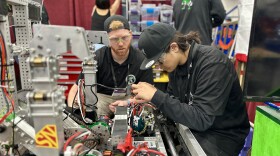In a rare show of force, thousands of Russians took to the streets of Moscow and other cities in the biggest anti-government protests in years.
In Moscow, police arrested hundreds of demonstrators, including prominent Russian opposition leader and anti-corruption activist, Alexei Navalny, who orchestrated the uprising.
The crowds gathered to protest government corruption, many calling for Prime Minister Dmitry Medvedev's resignation.
Navalny had called for nationwide protests after publishing an investigation earlier this month alleging mass corruption charges against Medvedev, whose large fortune far exceeded his position's salary.
At least 500 demonstrators were arrested in Moscow, reporter Charles Maynes tells NPR, among the tens of thousands who turned out nationwide — despite warnings from authorities that protesters would face fines and arrest for taking part in the illegal protest.
"There were reports of 2,000 people showing up in Nova Sibersk in Siberia, we had 10,000 in St. Petersburg, the estimates here in Moscow are about 20,000," he says.
But Navalny saw little of the protest he organized. Maynes says "Riot police detained the opposition leader as soon as he arrived in downtown Moscow, with Navalny supporters briefly attempting to pry open the police van that held him," in the capital's iconic Pushkin Square.
A total of 17 employees with Navalny's Anti-Corruption Foundation, were also arrested, the foundation's director and press secretary Roman Rubanov tells Reuters. The AP cites sporadic scuffles, most notably, "a gray-haired man whom police dragged along the pavement."
Russian state media, meanwhile, mostly ignored the day's events, save for earlier cursory coverage, and no comments have been reported from top Russian politicians.
Following criticism of the Trump administration's silence on Sunday's crack down, the State Department condemned the arrests by evening, calling the move "an affront to core democratic values." Spokesman Mark Toner said "the United States will monitor this situation, and we call on the government of Russia to immediately release all peaceful protesters," adding that Washington was "troubled" to hear of the arrest of Russian opposition figure Alexei Navalny.
Sunday amounts to "the biggest show of defiance since the 2011-2012 wave of demonstrations that rattled the Kremlin and led to harsh new laws aimed at suppressing dissent," says the AP. At the time, President Vladimir Putin accused then Secretary of State Hillary Clinton of inciting the protests.
Navalny is also credited with instigating those demonstrations, when he first rose as an anti-Kremlin threat through his blog and social media. As NPR's Lucian Kim reported, "he called on Russians to go out on the street and protest voter fraud in the parliamentary elections."
A fierce Putin critic, Navalny plans to run for president next year, when Putin's term ends. Putin is expected to run for a fourth term.
But last month, Navalny was found guilty of embezzlement in a case he claims is politically charged to disqualify him from running for president.
Though the candidate is essentially barred from state media coverage, as reporter Charles Maynes says, his heavy internet presence appears to be helping him use his anti-corruption message to expand his base, and attract younger crowds.
"Navalny has united people who think the same; that people don't agree with the authorities is obvious from what is going on in the country today," 19-year-old Anna Ivanova told the AP at the Moscow demonstration. "I am a bit scared."
Copyright 2017 NPR. To see more, visit http://www.npr.org/.






